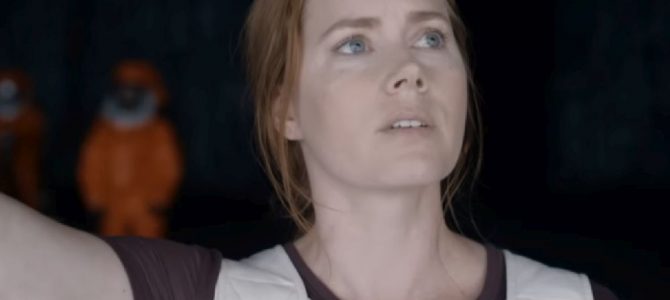
Spoilers below.
Denis Villeneuve’s “Arrival” celebrates the beauty in every human life without preaching a sermon, and the Academy of Motion Picture Arts and Sciences should award it Best Picture at the Oscars this year.
At the outset, “Arrival” seems like an average sci-fi thriller. Louise the linguist (Amy Adams) teams up with Ian the mathematician (Jeremy Renner) as they — along with a horde of bickering bureaucrats — attempt to find out why an alien race nicknamed the Heptapods have landed in shell-shaped spaceships all over Earth with a message composed in a mysterious language.
As Louise and Ian puzzle over the meaning of the Heptapod language, a more earth-bound mystery develops. Throughout the film, Villeneuve has been offsetting the narrative with scenes of Louise playing with what seems to be her daughter. We see Louise play cowboys with the child and watch the child draw pictures for Louise.
We also see the child die from what appears to be leukemia. It’s confusing since we know Louise is single — a fact she bemoans often early in the film — and aside from the occasional half-hearted advance from Ian, the film is free from romance.
The Key to the Time Sequence Mystery
But in a semiotic twist, both the mystery of the Heptapods and the mystery of Louise’s child become clear. The Heptapods do not view time as a linear unfolding of events. Instead, they understand their lives as a single moment of contemporaneous events. Birth, life, death — all are rolled into a unified whole for the Heptapods.
By learning their language, Louise also learns to see the world as a Heptapod. Now she can be single and have a child, for she begins to understand her own life as moment in an eternal present. Everything she’ll do in the future — fall in love with Ian, have a child with him, and then grieve as that child dies too early — becomes an eternally present moment in which she is always participating.
By framing the human experience in this way, Villeneuve frees “Arrival” from the heady bonds that tie other space epics to philosophical nerdoms. Unlike Christopher Nolan with “Interstellar” — the film to which “Arrival” is most often compared — Villeneuve does not attempt a grand cosmic narrative about humanity’s place in the universe. Instead, he tells a more universal story about mankind by focusing on a question that all of us will have to answer at some point in our lives: “Do you want to make a baby?”
The Eternal ‘Yes’ to Life
Ian asks Louise this question after the audience has figured out the film’s twin mysteries. This is the film’s climax, at least for Louise. Although Ian intends the question simply as an invitation to procreation, Louise understands it as so much more. Bringing a child into the world means condemning that child to pain and death. In this case, Louise knows the pain will be intense and the death will be too soon.
But it doesn’t matter. Louise thinks like a Heptapod now. She doesn’t anticipate death with fear, and since death is always in front of her it becomes just another natural part of life.
Louise’s “yes” represents an understanding of humanity not often seen in blockbuster films. Unlike other Oscar contenders this year — the musical “La La Land” especially — “Arrival” does not tout savoring the precious moments of life in memory. Instead, the film steps outside of humanity’s limited understanding of reality and encourages its audience to do the same. If we could see our entire lives as an instant, we would see there’s more to life than awaiting the next experience.
In one of the film’s final scenes, Ian hugs Louise and tells her he was worried for her safety when she was contacting the Heptapods. At that moment, Louise realizes Ian can only see his life as an unfolding of either pain or pleasure. Right now he’s worried for her safety, later he will want a child.
When Louise tries to explain to Ian that life makes more sense when lived always in the present, he does not understand. She explains how their daughter will die young — a slow painful death — and Ian divorces Louise, refusing to look at their child “the same way,” Louise says, because he can only see life as a race to get the most pleasure until death overtakes him.
A Beautiful Moment Worth the Pain
Had he freed himself from his selfish view of time, Ian could have seen his daughter’s life the way Louise sees it — the way we should see it — a beautiful moment, no matter how short we think it may be.
We don’t often see this sort of respect for human life in Hollywood, let alone in recent Best Picture front runners. The winners for the past three years — “12 Years A Slave,” “Birdman (Or The Unexpected Virtue of Ignorance),” and “Spotlight” — have all focused on race, identity, or sexual issues. While these topics are often worthy of great films, their subject matter often precludes some viewers from enjoying them.
“Arrival” tells a story about humanity to which everyone watching can relate. While not as flashy as “La La Land” or as gritty as “Hell Or High Water,” it asks a fundamental — and socially relevant — question about the dignity of human life: Do you want to make a baby?









